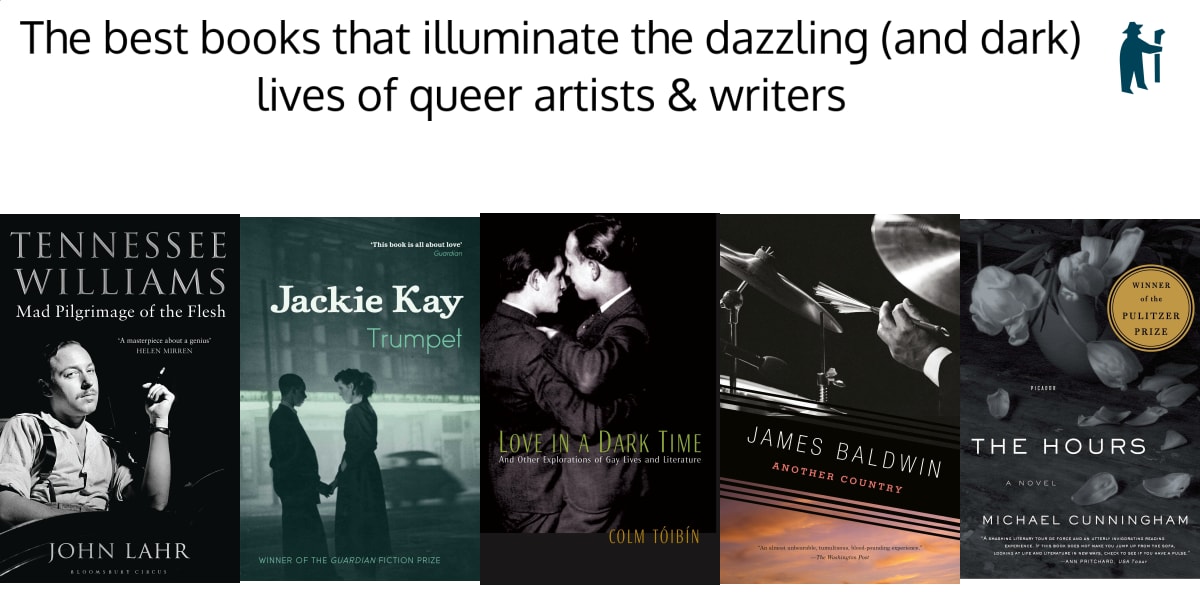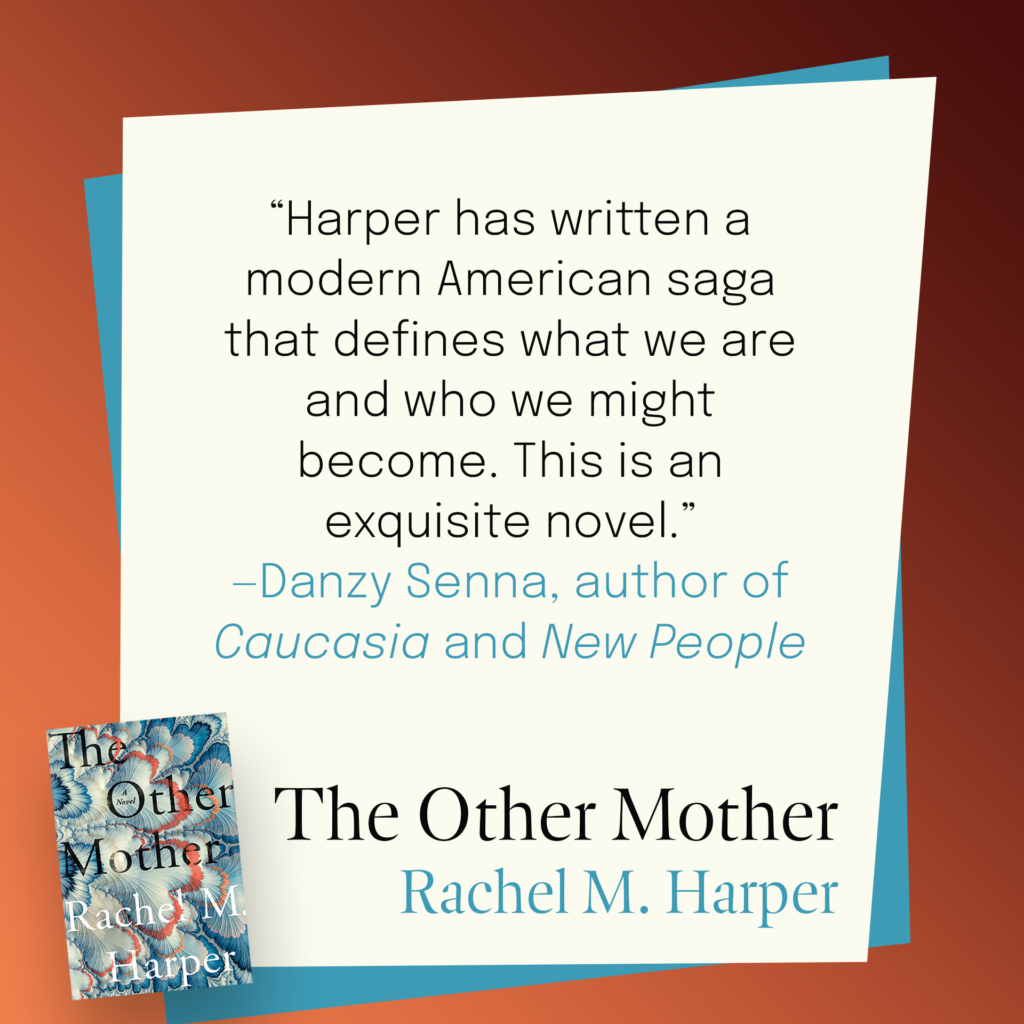
https://shepherd.com/best-books/the-dazzling-lives-of-queer-artists-and-writers
Rachel M. Harper’s The Other Mother was released on May 3, 2022. Please check Appearances page for more information on upcoming local & virtual events.
Order The Other Mother

“Every form is difficult, no one is easier than another. They all kick your ass. None of it comes easy.”
— James Baldwin
“You write from what you know, but you write into what you don’t know.”
— Grace Paley
Prologue
Arcelia
Before they knock down the door, I run. I’m wearing flip-flops, men’s pajama bottoms and a tank top with no bra. My sunglasses are on the top of my head. I grab my baby and tuck her under my arm like a purse. She is one of the few things I own, and unlike everything else in my possession, I’ve never lost or broken her.
I hear them enter the apartment—the front door cracks, their voices boom—but I’m gone before they catch me. Out the back window and down the alley before I know where I’m running to. Doctors always say I’m too skinny but you’ll never catch me with my hips stuck in no window—not even those small ones they put in basements—and I can still outrun almost any man, even in sandals and with a baby in my arms and a dope habit that keeps me shooting almost ten bags a day.
Essay originally published in Spalding MFA In Writing Blog.
I recently returned from a 4-week residency at MacDowell, an Artist Colony in rural New Hampshire. It proved to be an important month in my life, and in my writing career, but not in exactly the way I’d thought it would. I went seeking freedom, but what I found was a lot more meaningful.
Due to my work schedule and household responsibilities, it had been nine years since my last residency—something I tried not to resent, yet invariably did—and I was eager to return to the regimented yet utterly open days I had known in previous residencies, mealtimes being the only structure imposed upon each 24-hour cycle: the promise of bacon and eggs at every breakfast, so long as I arrived before 8:30 AM; lunches with hot soup and homemade cookies, quietly delivered to my studio each afternoon; the cow bell rung for dinner at 6:30 PM, where conversations and wine would flow in equal measure. Happily, these things were exactly the same. What I hadn’t counted on was that I was not the same.

The MacDowell Library
“Very early in life I became fascinated with the wonders language can achieve. And I began playing with words.”
— Gwendolyn Brooks
Lately, I have been writing without inspiration. I am working on several writing projects—two on my own, two with collaborators—and the deadlines are mounting. I write because my writing partner wants me to, or because the deadline is looming. I am not moved to write; instead, I am often forced to write. It is frequently uncomfortable; I feel silly, unmotivated, dumb. I would rather clear the backyard of dog poop, clip my toddler’s fingernails, or make banana bread from scratch. I would rather pick up dirty socks, stand in line at the post office, or read the alumni magazine that just arrived. I would rather go to the gym. I would choose an injury, or worse, the boredom of yoga, over the act of compulsory writing. And yet, when faced with the decision, I always end up sitting down to write. Why?
“We have made something we each get to claim, like sharing a dream, which makes it feel bigger, more real, and somehow easier to believe in. It is not about us as individual writers, or even “us” as the partnership, it is truly about the work.”
Writing is a solitary life—or at least that’s what many clichés about the writer’s life have told us. To live and die by the pen is to commit yourself to a life of solitude; whether at your desk, on a walk, or even at your local coffee shop, to say that you want to write means that you’re going to spend a lot of time by yourself. It is a sacrifice surely, but a necessary evil, like spending hundred of dollars on toner at Office Max—you’re a writer, and that’s what writers do. And then there’s this: even when surrounded by others, writers often feel alone.
For years I accept this truth, perhaps even relished it, but as I’ve gotten older, I’ve begun to warm to the idea of writing in partnership. I’ve often enjoyed other types of collaboration—like putting on plays in high school or playing little league, cooking a holiday meal or playing a cut-throat game of Hearts—but for years I squashed that desire when it came to my writing life. Mostly because I wanted to be in charge, but also as a result of the silence it required. I had a voice, and I had stories I wanted to tell, but I needed to work alone in order to hear them. Or so I thought.
“The past is beautiful because one never realizes an emotion at the time. It expands later, and thus we don’t have complete emotions about the present, only about the past.”
— Virginia Woolf
Short story originally published in Literary Pasadena: The Fiction Edition.
When you walk out of the house, leaving your three children behind, there is a part of you that thinks you will never go back. But it is a small part. Mostly you tell yourself that you just need a minute, just one minute to breathe, and once you feel your legs solidly beneath you, something that is just yours and meant to carry you alone, it’s going to be okay, you’re going to be okay, and you can go back to what you created.
But you don’t.
Last week, in the first days of Black History Month, a collection of essays written by luminaries in the black community was published. The book, BLACK COOL, is an anthology on cultural aesthetics edited by a national best-selling author, and has a forward written by a Harvard University professor with numerous honorary degrees and awards. The most surprising aspect of all of this is the matter of my own involvement—I wrote an essay that appears in the book. I’ve written two novels, two plays, three screenplays, many short stories, several TV scripts, and dozens of poems in my writing life, but prior to last year, I’d never written an essay. What’s more, I’d never written an essay that I didn’t want to write. But I did. And it got published. I’m going to tell you why.
“I lived in books more than I lived anywhere else.”
— Neil Gaiman
Essay originally published in Black Cool: One Thousand Streams of Blackness.
Growing up, I knew three things for certain about my father: He was brilliant, he was scary, and he was cool. These were not three separate things; they were one thing with three parts, the lines between them almost imperceptible, like the segments of a banana. He was a poet with a facility for language and an incredible memory—the ability to quote Yeats or DuBois in the middle of an argument, to recite Frost or Auden on the spot, to whistle the entire album of John Coltrane’s A Love Supreme. He was a large man, well over 6 feet tall, and linebacker solid, but he was light on his feet, and strangely graceful for a man of his size. He could walk soundless as a cat, appearing to glide across the room, but when he stood still he carried the weight of a mountain in his frame: we knew he could not be moved.
But it was not size alone that made him scary, it was the intensity of his gaze, how he would get quiet the angrier he got, eventually whispering as he delivered the final verdict, doling out the consequence for our crime of breaking the window with a miss-kicked soccer ball, lighting the quilt on fire, or coming home from the town swimming pool without our little brother. When he was most angry, he wouldn’t speak at all, the funk sometimes lasting for days. Somewhere in that space—between the silence, the brooding, and the brilliance—is where he created the cool.
As I approach 40, I’m coming to terms with several truths about myself:
I have never been a morning person. In high school I routinely stayed up until midnight and slept (when I was allowed) until after noon. I hung a sign on the door that read: “I Don’t Do Mornings,” which my father still likes to tease me about. (And, mind you, the sign is still hanging, though my old bedroom has become his office.) In college I took afternoon classes and worked the late night shift at the snack shop. If anyone needed to get picked up after last call, they called me. If anyone needed a sunrise drive to the airport, they skipped my number. In grad school I fell in with a crowd of the nocturnally gifted and began to stay up even later. I would regularly watch the sunrise across the San Gabriel mountains after a night spent writing a new story or developing photographs in my bathroom-turned-darkroom or watching Law & Order reruns on A&E while playing Ma-Jong with a group of film school dropouts and jobless musicians. Yes, it was a magical time.
Then, in my early thirties, it all changed.
“When I discover who I am, I’ll be free.”
— Ralph Ellison
The simple answer is that it’s a coming-of-age novel—the story of a teenage girl’s struggle to come to terms with the disintegration of her parents’ relationship, while she begins to embark on romantic explorations of her own. It’s also a story about family, and how the shape and structure often changes as time goes on, and how each member reacts to that change. It’s a book about fathers and daughters, about first love and family loyalty, and ultimately, it’s about forgiveness. Forgiving yourself as much as forgiving another.
In some way, I think everything I write is autobiographical. Everything is filtered through me, so a part of every character is me—or maybe a part of me is in every character. If the real question is, “Did this happen to you?” the answer is No. Yet some aspects of the story—many locations, and some of the narrative framework—are based on real places and experiences. But the plot is entirely fictional.
As a child, I didn’t have the audacity to want to be a writer. At different times I wanted to be a truck driver, a judge and an architect. But writing was something I always loved, telling stories that I would want to read, so I always came back to it. As a teenager, I used to try to imagine a life with a real job, like being a fireman or a librarian, and I would always start to imagine what could happen, how I could make it more interesting, and the next thing I knew I was outlining a story about someone else who was living that life. That was a pretty clear sign that I needed my job to be in a creative field, because I would use my imagination whether or not it was necessary.
Prologue
When I was seven I told my father that I wanted to grow up to be invisible. He told me to read Invisible Man. For him, the answers were always in books.
I did read Ellison’s novel, but I seem to have the opposite problem. People see me everywhere I go, remember me places where I haven’t even been. They follow me with their eyes, their questions. They ask me things I haven’t even asked myself.
“What are you, anyway?”
A bullfrog, a butterfly.
“I mean, where are you from?”
Boston. 151 Tremont Street. My mother’s womb.
“Your parents? Grandparents?”
New York. Minnesota. A Brooklyn brownstone. The Blue Ridge Mountains. A sod house in Iowa. A dairy farm.
“But what’s your nationality?”
I’m American.
“…Is that it?”
And German, Irish, and English. Cherokee, Chippewa. African. (Sorry, I don’t know from where.)
“You are all those things?”
Yes.
“You don’t look black.”
Do I look white?
“You look different, like no one I’ve ever seen.”
I look exactly like myself.